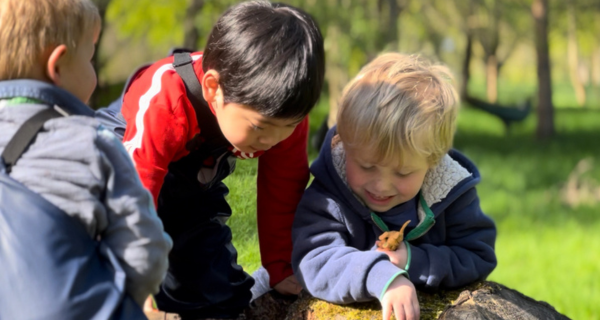If you’ve been keeping an eye on our Outdoor Learning Instagram, you’ll have seen the exciting range of outdoor adventures undertaken by our Junior and Senior School children this term. Outdoor Learning is an essential part of our curriculum right from Nursery through to Sixth Form.
We have long known the benefits that connecting with nature can have on our mental health, and the physical importance ‘risky play’ has on younger children. It helps to develop an awareness of their physical bodies and the spaces around them, lets them discover their own boundaries and hones their approaches to problem-solving.
What we now know is that there are emotional benefits to risky play, as well as physical. A recent study by Ellen Beate Hansen Sandseter, a Professor at Queen Maud University College of Early Childhood Education, dives into the importance of the emotional response to risky play: “Play with emotional, social, and physical risk may have evolved to increase the child’s psychosocial competency here-and-now, but also train them for future adult contexts”
In an ever-increasing risk-adverse world, children are not always given access to opportunities to safely and freely develop their risk-taking skills. Tim Gill, a leading philosopher on childhood in the UK states: “...removing all risk for children will have an impact on them as teenagers and adults. We are not only creating teenagers/adults who won’t understand risks that may cause physical harm but also risks that may have a significant positive/negative impact on their lives. Without understanding risk, teenagers/adults won’t be able to weigh up the pros and cons of risks/decisions and the potential outcome.”
So, how do we expose our children to risk? Building on early outdoor experiences within the Nursery garden, our trained Forest Kindergarten Leaders embark on adventures with our Nursery children almost every single day of term in our forest. Come rain or shine, the children enjoy playing in the outdoors, building shelters, climbing trees… the list goes on.
ESMS Forest Kindergarten Leader, Rosemary Welensky, explains: “What this new research tells us is that risky play can influence their emotional and psychosocial development for the better. As they grow it is these skills that will help them make good decisions, whether that is saying no to drugs or to getting in a car with an unsafe driver.
As our children move up through the School, the opportunities for risky play grow with them with. Residentials start from P4 in the Junior School with children undertaking a range of physical challenges from rock climbing and abseiling to kayaking. In P7 we take over 20 children to walk a section of the West Highland Way, covering 55 miles, over three days, raising money for charity. In S1 and S2, the students enjoy 5 days of activities, including mountain biking, hillwalking, skiing/snowboarding, sailing/canoeing, rock climbing, surfing and scuba diving. Meanwhile, our S3s head to Carbisdale, an eight-day unplugged outdoor adventure in the Scottish Highlands and a stand out highlight of the ESMS experience.
Anthony Simpson, ESMS Principal, saw the benefits to mental wellbeing first hand at Carbisdale this year: “It was fantastic to get the S3s into the outdoors for 8 days. So many of the students talked about how much they were enjoying being away from their phones. It is outdoor experiences like these that give the students a much needed chance to enjoy being a child again, having fun, away from the pressure of social media."
With every outdoor challenge our students undertake, we see their confidence and leadership skills developing, so that by the time they leave ESMS they have become rounded, resilient, accomplished individuals, all traits that we began nurturing, whether they knew it or not, from the ESMS Nursery rooms.






